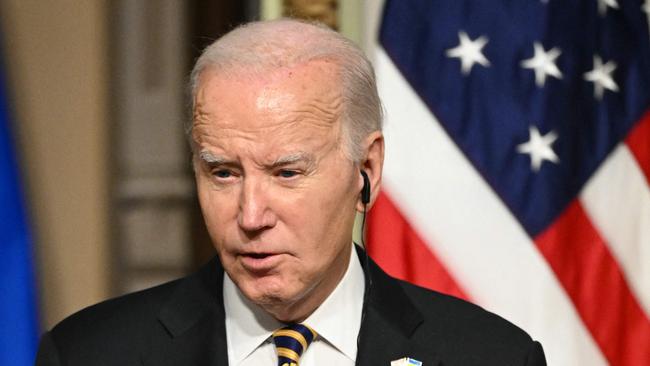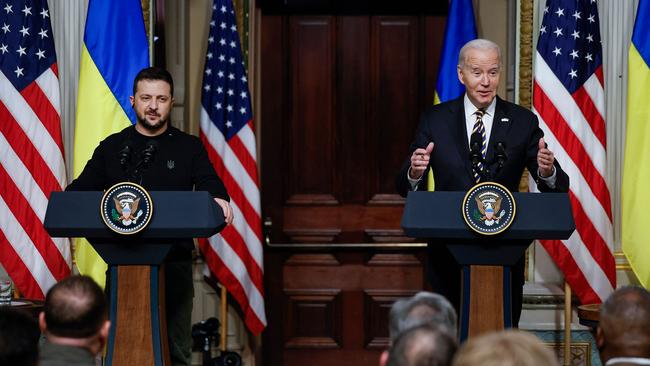From ‘as long as it takes’ to ‘as long as we can’: Joe Biden on Ukraine aid
Joe Biden dropped a crucial form of words in his remarks alongside Ukrainian President Volodymyr Zelensky, as the political and military realities of the Ukraine war bite.

After Russia invaded Ukraine in February last year Joe Biden repeatedly declared the US would stand with Ukraine “as long as it takes”.
That phrase was notably absent from his remarks at in Washington on Tuesday (Wednesday AEDT) alongside Volodymyr Zelensky.
The US would, Mr Biden said, “continue to supply Ukraine with critical weapons and equipment as long as we can”.
Zelensky, on a flying visit to the US capital to convince holdout Republicans to back a further $US61bn ($93bn) in aid for his government, wouldn’t be returning to Kyiv reassured.
Republican Senate leader Mitch McConnell said it was unlikely the aid package would be passed until the next year, given Democrats’ refusal to agree to GOP demands for tough border reform.
But even if congress did, it could well be the last batch of help before the 2024 presidential election.
According to Pew, a polling company, 31 per cent of Americans, including about 50 per cent of Republicans, don’t want the aid to proceed, up from 7 per cent at the start of the war.
Attitudes to the war have shifted radically in a short space of time. Until recently Americans were under the impression that Ukraine, armed with advanced NATO weapons and training, would blast Russia’s supposedly backward incompetent army out of the Donbass and probably even Crimea. Meanwhile, tough US-led sanctions would wreck Russia’s economy, forcing an increasingly isolated Vladimir Putin to the negotiating table. Backing Kyiv was a no-brainer.
But none of this has happened. The vaunted counteroffensive failed, adding to the grim total of hundreds of thousands of young men dead or severely maimed.

Advocates for more US aid have started to resort to stressing how the bulk of the money, which is debt-financed given the US government’s massive deficit, would go to US arms manufacturers, which in turn is good for US jobs and growth.
It’s a less uplifting sell than it was.
Mr Biden once again ignored a reporter’s question on whether the US shared Mr Zelensky’s war aim of kicking Russia out of Crimea, which it has held since 2014, as well as the four annexed provinces, undermining the appeal still further for those who worry the US is being drawn into another trillion-dollar quagmire, albeit one with the risk of nuclear war attached.
“The Ukraine counteroffensive has been a catastrophe: very little territory gained at a tremendous cost in lives and weapons. Writing another $US61bn cheque to Ukraine is tripling down on this failure,” said Republican senator JD Vance last week, echoing what’s becoming the majority GOP view.
A cynic might think that even Republicans openly supportive of aid to Ukraine have linked funding to major immigration reform they know the Democrats will not agree to.
Meanwhile, the White House might be happy to have someone to blame to avoid becoming associated with a devastating war that’s not gone plan.






To join the conversation, please log in. Don't have an account? Register
Join the conversation, you are commenting as Logout